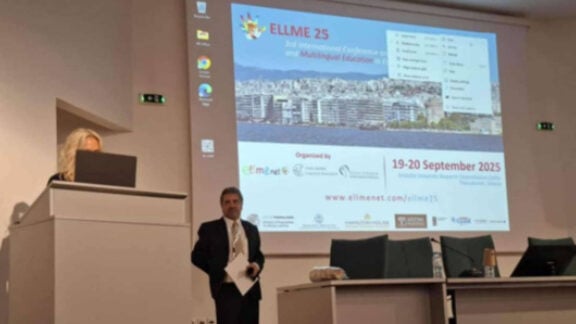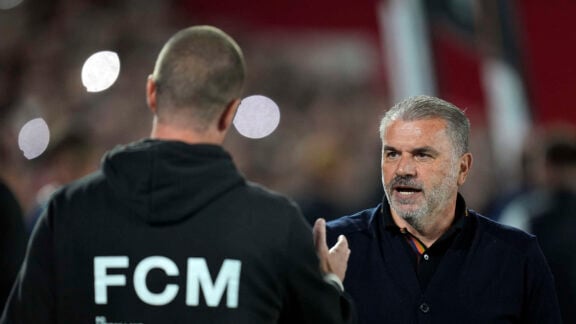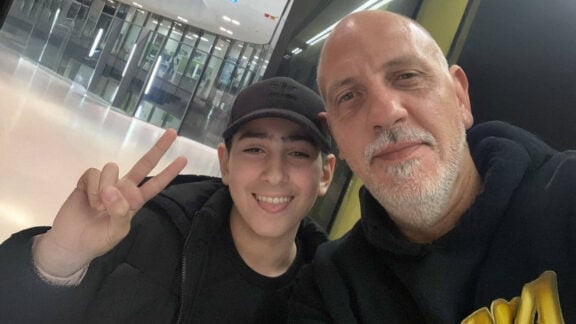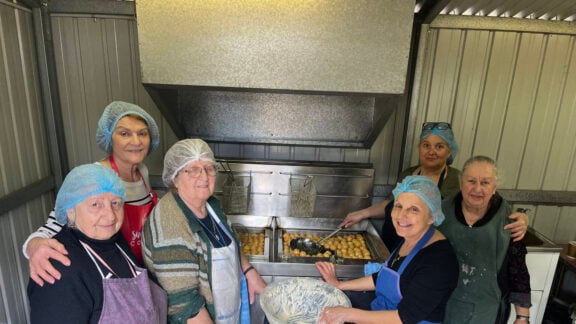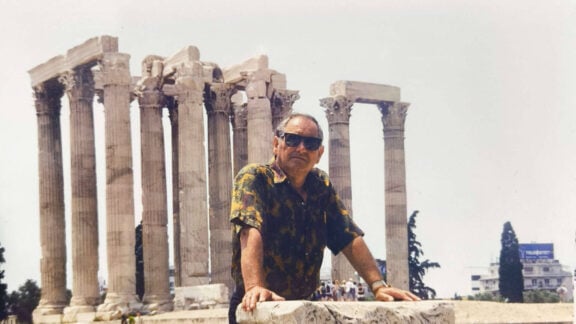My friend Stathis Paraskevopoulos died on the day of his birthday, June 16. He was only 60.
The last time I saw him was by Zoom in September last year – I interviewed him, and like all our conversations since 1985 it was a rambling, comedic repartee about the world, war, politics, music, art, and film.
I did not write up the interview, and as it often is, friends and family come last when it comes to work.
The festival adviser and media guru
I wanted to talk about his role as an adviser to the Drama International Short Film Festival (DISFF), the 44-year-old festival of short films from across the world.
At the time, Stathi was with his friend and theatre maker, Barbara Dukas, and they ran a ‘pitching lab’ at the festival. I was in Athens, and he was in Drama, northern Greece. Strange, we always met if we were both in Greece but this time, we did not meet. We would never meet again.
Stathi was deeply immersed in the media industry and media culture for 30 years. He worked in Greece, the UK twice, Los Angeles, Israel, and other places.
For the last 4-5 years he was in London, initially in media tech and later as a senior consultant for SP Broadcast Media.
Terminal diagnosis: battling cancer with dry wit
Last month, I thought I’d finish that interview and I messaged him; “Megale, – (dude in Greek argot)- let’s lock that interview down, I’ll update it so I can refresh it.”
Stathi in his dry wit said, “Your timing is impeccable Kapetopoulos as always, I’ve just been told that I’m terminal.”
A rare form of cancer was undermining Stathi for the last few years, but I thought, he’d beat it.
We first met in 1985, through our mutual friend, Ross Karavis. I was going through one of my many St Elmo’s Fire style break-ups, and Stathi has just arrived from Greece.
He dressed in black, and wore dark-rimmed glasses, smoked copious amounts of cigarettes, and drank coffee – lots of coffee. He was super intellectual and very funny. Acerbic.
He was doing Honours in Philosophy at the University of Adelaide and I was doing Honours in Politics a Flinders University. His accent was transglobal, combining British, South African, and Australian. His story is common to many of us migrants’ kids.
He was born in Australia, but his family returned to Greece in the 1970s. However, the Junta forced them out, and they migrated to South Africa, where Apartheid forced them out, and they returned to Greece after the fall of the Junta. Finally, around the mid-1980s, he came back to Australia to study.
Opening doors to a new Greece: Stathi’s critical perspective
Stathi was erudite, articulate, cultured, and very funny – very Athenian. He was sceptical of all authority, especially government, particularly the Greek government.
He loathed the moral certainty of the conservatives and was irritated by the virtuous claims of the left. He saw the hypocrisy of all things. The vicious Greek right wrapped in tradition, and turgid socialists pretending to be progressive.
He saw ridiculousness in things we were told to revere – church, state, ideology, and political parties. Stathi opened a new Greece to me.
He introduced me to new-wave Greek cinema, Greek punk, and hardcore grunge. We talked about new music, Tzimi Panousis, Last Drive, Birthday Party, The Residents, Nina Hagen, and more. We saw lots of Jim Jarmusch and David Lynch.
In Adelaide, he met the love of his life, the equally articulate Angelina Vincenza Pilello, or Angela. They left to make a life in Athens. Angela became fluent in Greek and worked in publishing among other things.
Together they had Stefano. He was gifted with the combined intellectual capacity of both. The Greek financial crisis was difficult for them. Like many professionals, they felt the pain.
Both Stathi and Angela became part of Greece’s brain drain and had to find new work, and they did in London again.
Emotional moments and lasting influence
In the final weeks of Stathis’ life, we used Messenger to talk, as he struggled with hospitals, pain, and mobility issues.
I had to ask if it was that final. “Well, that is what everyone says unless you find a shaman take mescaline and exorcise my tumours.,” wrote Stathi.
“Not a bad idea man, I’ll do mescaline for you,” I said. “Like you need an excuse Kapetopoule,” he laughed. I worked as hard from then on to make him laugh. And we did, like always.
Another time I had not heard from him and became worried. Finally, he responded that he was out finalising things because, “even death has its bureaucracy”.
We kept talking mainly comedic banter, but one day he was scared about leaving Stefano and Angela behind. “What will they do?” He felt guilty.
I could not help it and wrote, “The foundations you’ve laid for Stefano will come to fruition and your Angela will be indebted to you for opening a new world for her.”
“I’m not very good at emotionality malaka, but for the sake of something- you need to know that you’ve been a great influence on me. You made me break away from that bombastic Greekness of Mikis Theodorakis, and λαϊκά παιδιά laika pethia, (folk kids) you showed me rockers like Tzimis Panousis, and underground comix like Babel and… malaka… some of your music tastes are so obscure that one can hardly call them music, but alas you opened many doors for me – and I love you – f-ck that’s it…”
His response was laden with the sort of emotion I can never remember Stathi expressing, “Kapetopoule, thank you. I have enjoyed our banter over the years and following your writing. And thanks for your words for Stefano and Angela.
“Keep the spirit because the world is turning grey, and we are the last dinosaurs that still laugh.”
Well, the world may be “turning grey”, but Stathi since the day we met would assuage my anguish whenever I was down with, “Καπετόπουλε, όλα θα ασπρίσουν το πρωί. “Kapetopoule, all will turn white in the morning.”
‘All will turn white in the morning’
Stathi leaves behind his love, Angelina Vincenza Pilello and his son Stefanos Paraskevopoulos Pilello. He leaves his sister Patricia Skliamis and her husband, Yiannis Skiliamis, their children Andriani and Konstantinos and their grandchildren, Yiannis and Elpida, his mother Fotini. His father Athanasi has passed away.
He was loved by all, by his mother-in-law and father-in-law, Giuseppe, and Concetta Pilello, by his sister-in-laws Cristina, Enza and Gabriella; their husbands – John Ieraci, Pino Ielasi and Eric De Pierro; his nieces and nephews, Isabel, Alessia, Claudia, Luca, Marco and Daniella.Stathi impacted on all many of his friends – he went out of his way to help, to guide and to simply spend time with.
Stathi’s dear friends, Barbara Dukas, Ross Karavis, Maria Tsopanis, and many others will miss him.
As Stathis always said, “όλα θα ασπρίσουν το πρωί” – “all will turn white in the morning.”
Vale, my friend.


